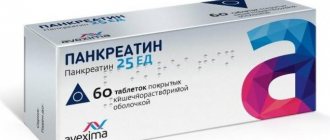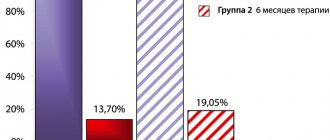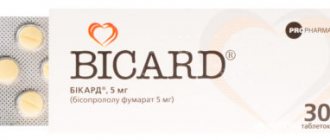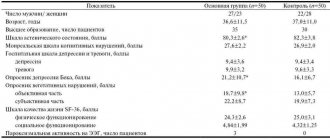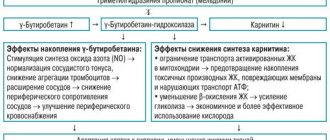Clinical effectiveness of the drug "Zakofalk" in the complex therapy of chronic pancreatitis
Yuryeva A. E.
Relevance of the problem: Chronic pancreatitis is a progressive inflammatory process in the pancreas lasting more than 6 months, which persists after the cause that caused it has been eliminated. Chronic pancreatitis leads to the gradual replacement of an organ with tissue that does not sufficiently perform its functions. Over the past 30 years, there has been a twofold increase in the number of patients; in addition, chronic pancreatitis has become significantly “younger”, the average age since diagnosis has decreased from 50 to 39 years, and the proportion of women has increased by 30%. The proportion of alcoholic pancreatitis increased from 40 to 75%.
Purpose of the study: to evaluate the effectiveness of the drug "Zakofalk" in the complex therapy of chronic pancreatitis with a predominance of exocrine insufficiency.
The most important of the short-chain fatty acids is butyric acid, which, in combination with the prebiotic inulin, is not only a source of energy for colon epithelial cells, but also affects a wide range of cellular functions, maintaining intestinal homeostasis.
Physiological effects of butyric acid: regulation of water-electrolyte balance in the large intestine - antidiarrheal effect in diarrhea syndrome, creation of a favorable environment for the growth of its own beneficial microflora - prebiotic effect in dysbiosis syndrome.
Materials and methods of research: 35 patients were observed with a diagnosis of chronic pancreatitis, of which 25 were caused by cholelithiasis, 4 due to duodenal diverticulum, 6 due to alcoholic etiology. The proportion of men: women is 6: 29. The disease with chronic pancreatitis in 100% of cases is aggravated by dysbiosis syndrome of 2-3 degrees. The quantitative and species composition of the intestinal microflora was studied before and after treatment. All patients in complex therapy took the drug "Zakofalk" 1 tablet 3 times a day before meals for a month. At the end of treatment, the clinical symptoms of the disease and the results of intestinal microflora were assessed.
Results: inclusion in the complex therapy of chronic pancreatitis, namely: diet No5, the use of microencapsulated enzyme preparations, proton pump inhibitors, myotropic antispasmodics, intestinal sanitation with antibacterial agents - the drug "Zakofalk", led to an improvement in the general well-being of patients, a decrease in pain, a decrease in flatulence , normalization of stool with a tendency to become fixed, which made it possible to reduce the dose of enzyme preparations, normalization of intestinal microflora.
Conclusions:
The drug "Zakofalk" is the only drug of butyric acid in combination with the prebiotic inulin, indicated in the treatment of chronic pancreatitis in order to restore intestinal microbiocenosis, regulate the water-electrolyte balance in the large intestine, which, together with therapy, leads to the subsidence of the process of exacerbation of chronic pancreatitis, improves the quality of life of patients: affects the process of exocrine pancreatic insufficiency, allows to reduce the dose of enzyme preparations, thereby optimizing the pharmacoeconomics of the treatment of chronic pancreatitis, and can be recommended for the treatment of this pathology.
Published in a collection of scientific and practical works edited by M.D. Ardatskaya “Clinical experience of using the butyric acid drug ZAKOFALC by doctors of various specialties” Moscow, 2011.
How is irritable bowel syndrome treated?
Treatment of IBS is a lengthy process and must be carried out under constant medical supervision. All medications for the treatment of IBS should be prescribed only by the attending physician on an individual basis, taking into account the prevailing symptoms. If you have been diagnosed with IBS, you must strictly follow your doctor's recommendations for taking prescribed medications, adhere to an appropriate lifestyle and diet.
Lifestyle recommendations
1. Keep a food diary for 2-4 weeks to identify foods that trigger IBS symptoms and worsen the disease. Pay attention to the connection between the occurrence of IBS symptoms and the consumption of foods that most often cause them (fatty foods, dairy products, chocolate, alcohol, caffeine-containing drinks - coffee, tea, cola, energy drinks, sorbitol sweeteners), and also cause gas formation (legumes and some other vegetables).
2. Follow a work-rest schedule, do not overwork, try not to be nervous and do not allow negative emotions. If you often experience neuropsychological stress, anxiety or depression, seek help from a psychologist or psychotherapist.
3. Move more, do gymnastics, yoga, swimming, walking.
4. If IBS is accompanied by constipation, do not ignore the urge to defecate, provide comfortable conditions for defecation, preferably at the same time (in the morning after breakfast).
5. Monitor your body weight (excess body weight leads to constipation).
Visit your doctor regularly (at least once every 6 months) to conduct the necessary tests. This will contribute to the correct selection of drugs, effective treatment and prevention of complications.
Do not try to treat yourself, or on the advice of relatives or friends.
.
Medicines for the treatment of IBS
Treatment of IBS is symptomatic, i.e. medications are used that affect the symptoms of the disease - abdominal pain, and the predominant bowel disorder - constipation or diarrhea. So it will always be a combination of several drugs.
For the treatment of constipation in IBS
It is recommended at the first stage to change your lifestyle (active lifestyle), take enough fluids and increase dietary fiber.
It is worth noting that not all dietary fiber can be used in IBS patients. So coarse fiber (bran) is not effective for IBS. Soft dietary fiber (psyllium) does not irritate the intestinal mucosa and is effective against constipation. The effectiveness of psyllium has been confirmed in a large number of studies, which has led to the inclusion of psyllium in recommendations for the treatment of IBS with Azpor as a first-line treatment. More information about the psyllium preparation (Mukofalk) and its use for constipation, IBS and other diseases can be found on the website www.mucofalk.ru .
If psyllium is ineffective, it is recommended to add laxatives to the treatment.
For the treatment of diarrhea in IBS
drugs that have an antidiarrheal effect are recommended (loperamide, intestinal antibiotics, drugs that absorb bile acids, probiotics).
For the treatment of abdominal pain due to IBS
According to modern recommendations, antispasmodics and regulators of intestinal motility and, in severe cases, antidepressants are used. Their goal is to relieve spasms and normalize intestinal motility. The effectiveness of these drugs for IBS, according to research, is 53-61%. Unfortunately, it is not always possible to achieve complete pain relief; you have to change one antispasmodic to another.
Storage conditions and periods
The shelf life of the drug is two years from the date of its manufacture. The release date is always indicated on the packaging and is duplicated on blisters or tubes. Storage temperature should not exceed 25 degrees. Children's access to tablets should be limited. Do not expose the product to direct sunlight or exposure to other heat sources. The place where tablets are stored should be dark and cool enough.
Video on the topic: Zakofalk NMX
Side effects
Zakofalk is safe for the body and does not cause side effects. The exception is when taking the drug if there are contraindications. As a result of such violation of recommendations, an allergic reaction may occur on the skin.
If Zakofalk is not suitable for use due to the individual characteristics of the body, then as a result of its use, symptoms of gastrointestinal dysfunction may intensify.
Overdose
In medical practice, no cases of overdose with Zakofalk have been recorded . The drug contains herbal components, which, even at high concentrations, are not capable of creating a threat to human life or causing serious disruptions to the performance of internal systems. An overdose in the presence of contraindications will provoke side effects.
Contraindications
During pregnancy, the components of the drug can harm the condition of the fetus. Contraindications for taking the drug include individual intolerance to its components. Before taking Zakofalk, it is recommended to undergo a comprehensive examination. Patients prone to allergic reactions should take the supplement with caution and only after consultation with a specialist.
If hypersensitivity to substances contained in the tablets is detected, the drug should be replaced with a safer option.
The following conditions are contraindications for taking the drug:
- children under 12 years of age;
- pregnancy at any stage and lactation period;
- hypersensitivity to individual components of the tablets.
During pregnancy
At any stage of pregnancy and during lactation, taking the drug is contraindicated. The components included in its composition can harm the condition of the fetus and cause problems with its gestation. During pregnancy, it is better to replenish the supply of vitamins and useful elements with specialized and harmless biologically active food additives for this period.
See the article about a drug that copes well with diarrhea. The product is absolutely safe both during pregnancy and during breastfeeding. https://gastrocure.net/preparaty/protivodiarejnye-i-protivovospalitelnye/enterosgel-sokhranyaet-balans-mikroflory-kishechnika.html
Price
The cost of Zakofalka in different regions may vary slightly. When ordering a dietary supplement online, the price includes delivery costs. Due to this nuance, the cost increases and differs from the pharmacy option. When purchasing a drug, it is important to pay attention to the integrity of its packaging and the information in the instructions.
Cost of the drug:
- the average price in Russia is from 900 rubles;
- in Ukraine, the cost of the drug is approximately 500 hryvnia.
Analogs
There are many drugs that, if necessary, can replace Zakofalk, but their general description will be different. All of these analogues normalize the intestinal microflora and have a beneficial effect on the mucous membranes of the digestive organs, but each of them has its own application characteristics and an expanded list of indications.
When replacing Zakofalk with other drugs, it is important to pay attention to possible differences in contraindications.
The following drugs have similar properties.
| A drug | Description |
| Hilak Forte | complex preparation for restoring normal intestinal microflora |
| Bificol | widely used for dysbacteriosis |
| Symbiform | additionally eliminates the consequences of intestinal infections |
| Prema | the drug belongs to the group of symbiotics |
| Probinorm | the drug not only restores the natural intestinal microflora, but is also able to neutralize dysfunction of the digestive system |
| Lacto | prescribed for numerous pathologies of the digestive system that disrupt the intestinal microflora |
| Spazmolak | recommended for functional disorders of the digestive system |
| Lactobact | used in the complex treatment of numerous diseases of the digestive system |
| Symbiolact | suitable for treating not only adult patients, but also children from the first days of life |
| Normagut | additionally eliminates symptoms of diarrhea of various natures |

